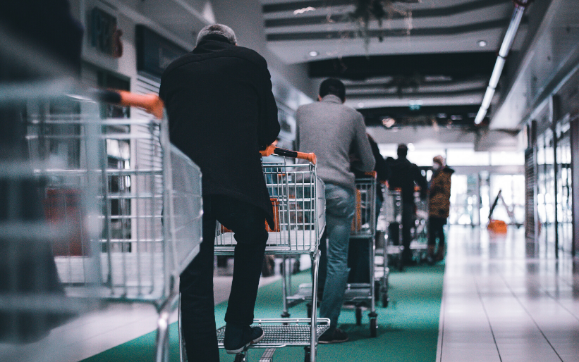Justice Center News
The Justice Center News blog features our advocacy on issues affecting low-income New Yorkers today and the latest CBJC happenings. For press releases, click here. For publications, click here.

Price Gouging: What It Is and What You Can Do About It
by Kyara Martinez June 25, 2020
In response to the coronavirus pandemic (COVID-19), New York City’s Department of Consumer Affairs (“DCA”) has expanded protections related to the illegal practice of price gouging. An emergency Rule enacted on March 15, 2020 makes price gouging illegal for any personal or household goods or services that are necessary to prevent or limit the spread of COVID-19 (the “NYC Rule”). In addition, on June 6, 2020 Governor Andrew M. Cuomo signed New York State legislation banning price gouging of essential medical supplies and services used to care for, cure, prevent, and treat any illness or disease (the “NYS Law”). The NYC Rule will remain in effect until September 11, 2020, as DCA prepares a permanent rule. A public comment period on the proposed new permanent rule governing price gouging during a declared state of emergency closed on June 12, 2020.
The NYC Rule enacted in March generally prohibits merchants from selling or offering for sale personal and household goods and services including cleaning products, disinfectants, hand sanitizer, paper towels, and personal protective equipment priced 10% or more above their regular price 30-60 days before the Rule’s adoption. The NYC Rule broadly defines merchants governed by the regulation as any person or business that buys or sells any covered goods or services for profit. Please refer to the NYC Department of Consumer and Worker Protection’s Website for a complete list of items covered by the NYC Rule. Any confirmed violation of the emergency NYC Rule can result in a $500 fine for each sale or offer for sale of any covered items.
The NYS Law amended in June broadens general business law provisions relating to price gouging by expanding the list of covered goods to include “hand sanitizer, bandages, face masks, medical-grade apparel, and other crucial medical supplies needed by hospitals and other healthcare facilities.” Any confirmed violation of the NYS Law can result in a civil penalty that is the greater of “up to $25,000 per violation, or three times the gross receipts for the relevant goods or services” sold.
What does price gouging look like? Here, we will offer price gouging examples relevant to the NYC Rule and NYS Law.
Example 1: A local grocery store in New York City ordinarily sells a particular variety of paper towel roll for $1. Upon the declaration of the national public health emergency and the City’s first coronavirus patient, the same local grocery store began selling the same item for $2 (which is a 100% price increase). The local grocery store is likely violating the emergency NYC Rule by engaging in price gouging which makes it illegal to increase the price of covered items by 10% or more.
Example 2: A local grocery store has been selling bottles of hand sanitizer at an increased price and the DCA finds that the grocery store is in violation of the emergency NYC Rule. Upon discovery, each individual bottle of hand sanitizer that has been sold or offered to be sold at the excessive price will each constitute a $500 violation.
Example 3: A medical-grade apparel wholesaler in Queens has been selling boxes of face shields and gauzes to hospitals for a much higher level than market price. This vendor is likely in violation of the NYS Law and may be fined up to $25,000 per violation or three times the wholesaler’s gross receipts for the apparel – whichever is greater.
Steps to Stop Price Gouging
- If you think a New York City merchant excessively increased the price of coronavirus-related consumer goods beginning in March, file a complaint online or call 311 and say “overcharge”. Consumers who believe they were victimized by price gouging should keep their receipts and any information about the store where the transaction occurred.
- New Yorkers can now report sudden and unexpected increases in consumer goods such as hand sanitizer, cleaning supplies, or other health and sanitation related products by calling the consumer hotline toll free at 800-697-1220. This line is available seven days a week from 8:30 a.m. to 8:30 p.m. for consumers.
- If you think your hospital or clinic has experienced price gouging in New York State from a vendor or supplier please file a complaint online with the Office of the Attorney General or file a complaint online with the Department of State, Division of Consumer Protection.
- New York State consumers can also call for complaints at The Consumer Assistance Services Unit Monday to Friday from 8:30 a.m. to 4:30 p.m. via toll-free helpline at 1-800-697-1220 or via local line at 518-474-8583.
Additional Resources:
Consumers: Have you tried to buy any good or service needed to limit the spread of COVID-19? Download flyer here
Businesses: Do you sell any good or service needed to limit the spread of COVID-19? Download flyer in: Download flyer here
Recent posts
-
June 11, 2024
NELP and Partners Serve 40 Small Business Owners For National Small Business Month
In honor of National Small Business Month 2024, the City Bar Justice Center’s Neighborhood Entrepreneur Law Proj...
Read more -
April 22, 2024
NELP and Partners Empower Small Businesses on Annual Financial Institution Pro Bono Day
The City Bar Justice Center’s Neighborhood Entrepreneur Law Project (NELP) was proud to participate in the 5th A...
Read more -
April 19, 2024
Statement of the Executive Director of the City Bar Justice Center Opposing IOLA Diversion and the Undermining of Complementary Public Service Programs
The City Bar Justice Center strongly opposes the inclusion in the FY2024-25 New York State budget of an eleventh-h...
Read more














